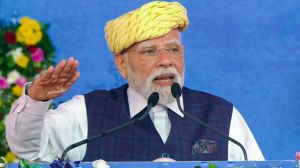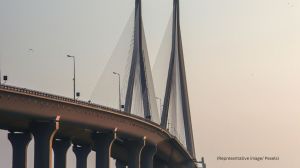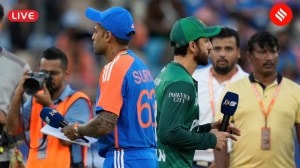India’s line to US: Pak first, then Iraq
As US President George W Bush was through with a half-hour meeting with Indian Deputy Prime Minister L K Advani at the White House yesterday...

As US President George W Bush was through with a half-hour meeting with Indian Deputy Prime Minister L K Advani at the White House yesterday, it was clear that the two sides were engaged in hard bargaining over two crucial issues — Iraq and Pakistan.
While the US is pressing India to join policing in Iraq, New Delhi is demanding that Washington persuade President Pervez Musharraf to take concrete steps to end cross-border infiltration and dismantle the terrorist network in the Pakistan-occupied Kashmir. Neither has said ‘no’ to the other, but India is clearly buying time.
Bush has assured Advani that he would persuade Musharraf during his US visit later this month to address India’s concerns. New Delhi would first see how it works and then take a decision on the deployment of Indian troops in Iraq.
The time factor is loaded in favour of India. It is in no hurry to proceed either on troop deployment or on the peace process. Not so with the US. Bush, like his key ally, Prime Minister Tony Blair of Britain, is uncomfortable on the domestic front, trying to justify the Iraq war in the wake of its failure to unearth any weapons of mass destruction. Any noticeable increase in the rate of American casualties can compound his discomfiture.
There are not many countries he can turn to. India has a large, trained Army and its troops are capable of operating in the difficult terrain of Iraq. Besides, India has a long history of assisting Iraqis in a wide range of fields. Therefore, Bush must rope in India, and fast at that.
Advani, a hardliner on the Pakistan issue, told journalists at the White House after his meeting with Bush that ‘‘certain questions were raised and some answers were sought’’ by him on the Iraq issue. The effort was to buy time till Musharraf’s visit got over. The US has decided to send a team of Pentagon officials to New Delhi next Monday to allay India’s apprehensions. Some more clarifications may be sought thereafter. Then, the matter will go to the Cabinet committee on security (CCS) for a decision. By the time the exercise is through, India would know what the US had done to pressure Musharraf to meet Indian demands.
The US may not let this impression gain currency, but the fact is the Advani-Bush meeting was pre-planned and not accidental as it was made to look like. India has suddenly acquired more topical importance for Washington due to the US stakes in Iraq.
The President’s arrival soon after the meeting between Advani and National Security Advisor Condoleezza Rice began, speaks of the urgency of the issue at hand.
Advani, during his meeting with Attorney-General John Ashcroft, handed him papers proving the involvement of Hizb-ul-Mujahideen in terrorist activities. Though on the US watchlist, this organization is not banned, is very active in India and provides logistic support to other terrorist outfits. The Indian effort is to get the US ban it so that its fund flow is stopped.
Advani was in for a surprise at an interaction with members of think-tanks representing nine organizations at the residence of Indian Ambassador Lalit Mansingh.
The same people who in January last year had been wondering why Advani was not in favour of a dialogue with Pakistan, were themselves skeptical about the Indian peace initiative this time.
Photos



- 01
- 02
- 03
- 04
- 05




























